Module 1 Unit 2 Culture Shock. 课件 (共30张PPT)
文档属性
| 名称 | Module 1 Unit 2 Culture Shock. 课件 (共30张PPT) | 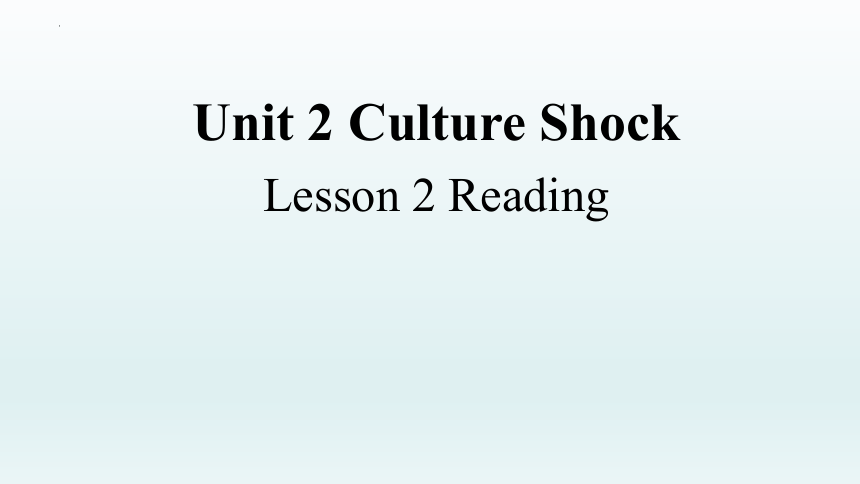 | |
| 格式 | pptx | ||
| 文件大小 | 1.8MB | ||
| 资源类型 | 教案 | ||
| 版本资源 | 牛津深圳版 | ||
| 科目 | 英语 | ||
| 更新时间 | 2022-06-04 17:43:22 | ||
图片预览

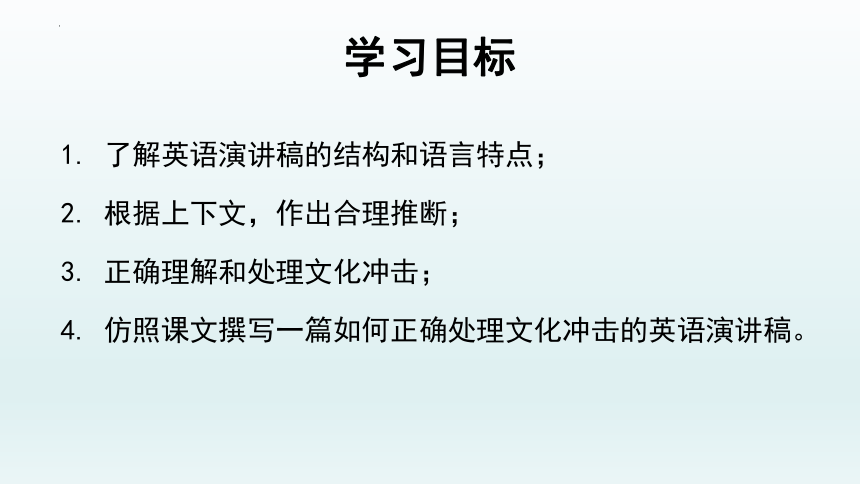
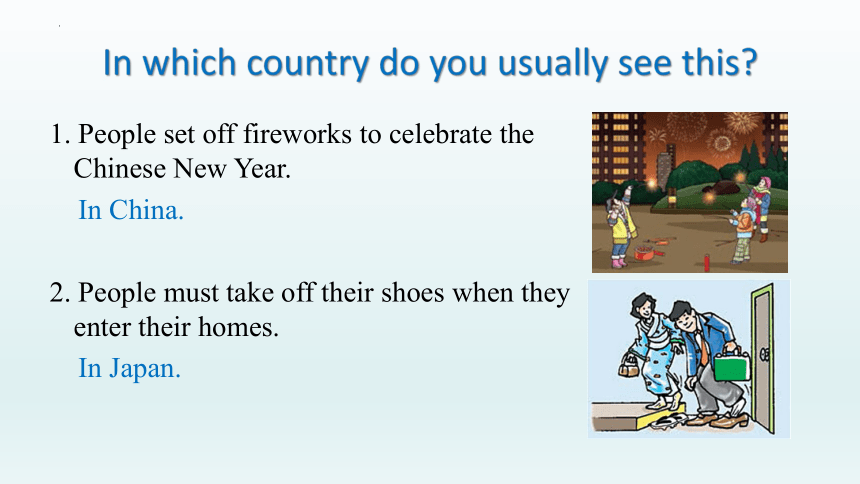

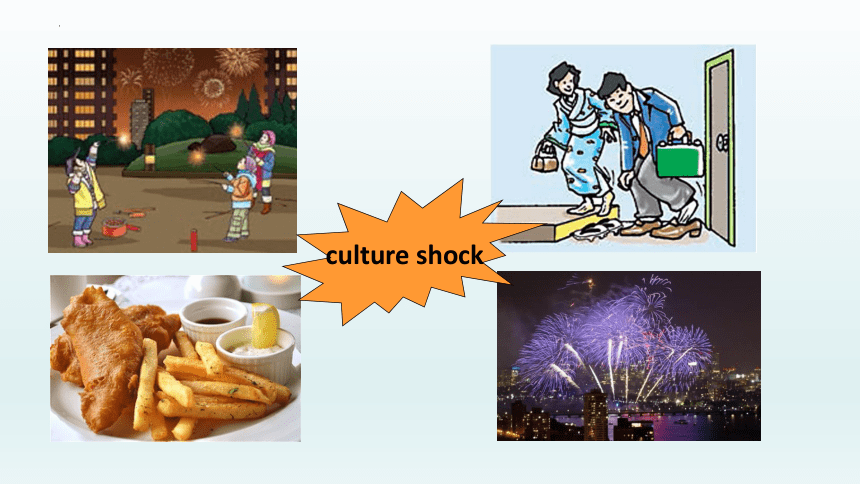
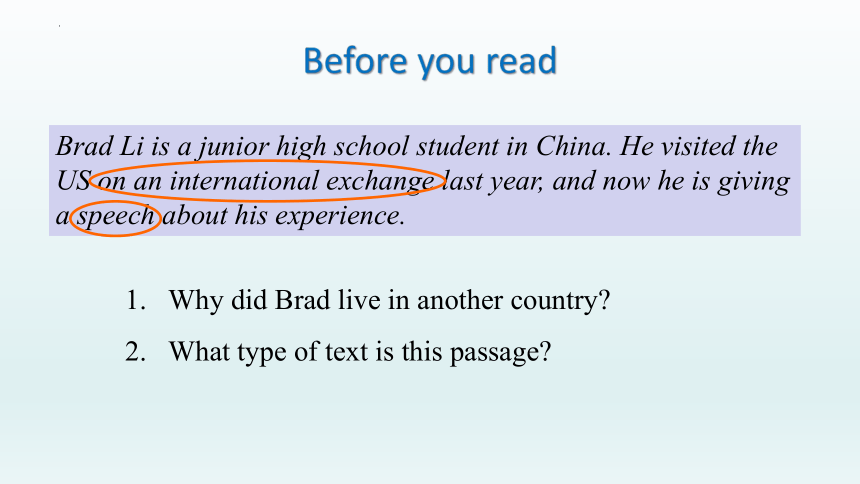
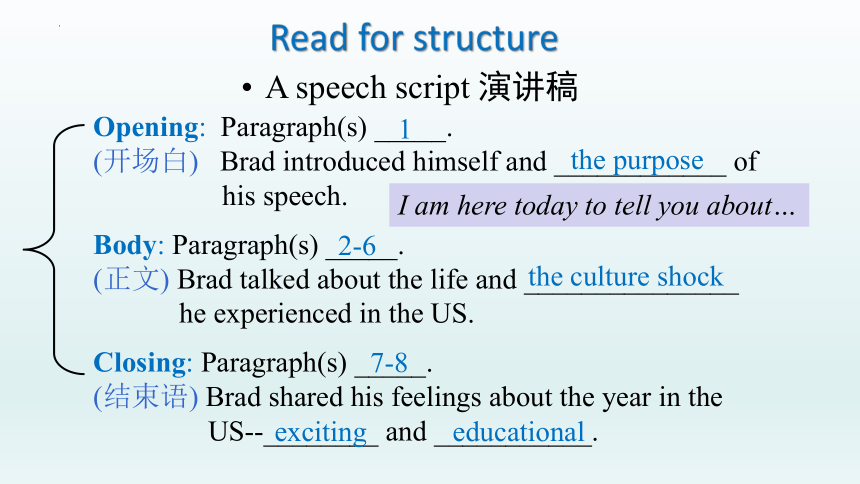

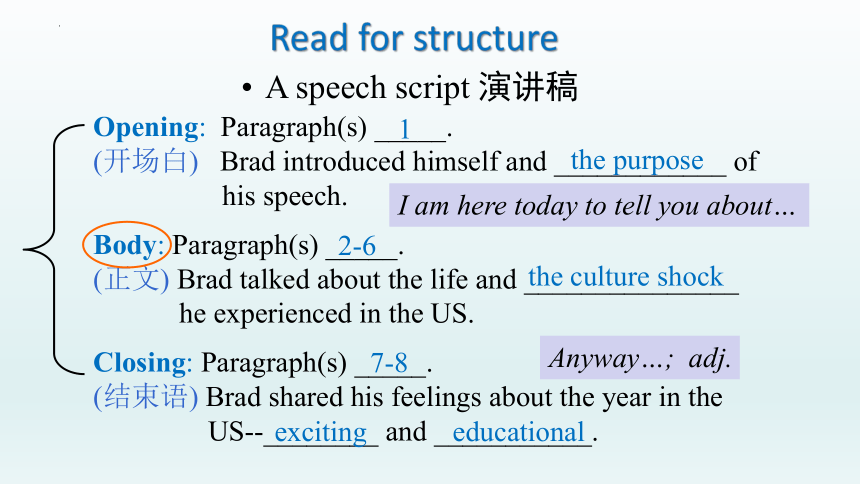
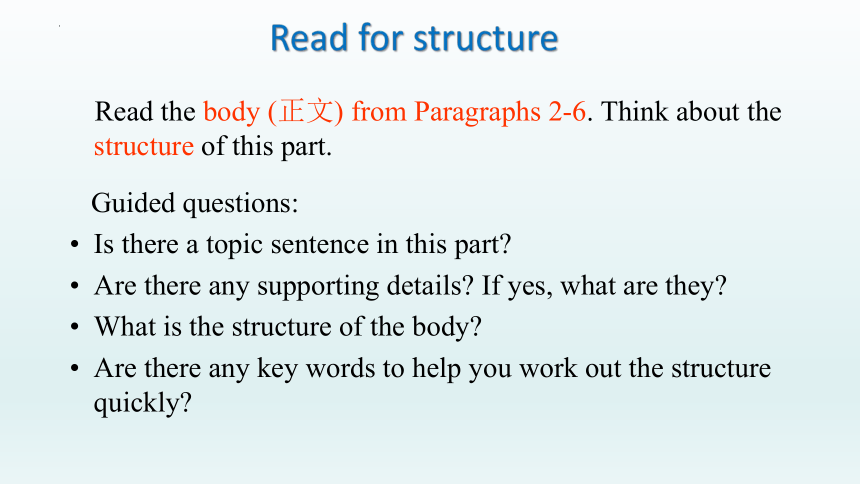
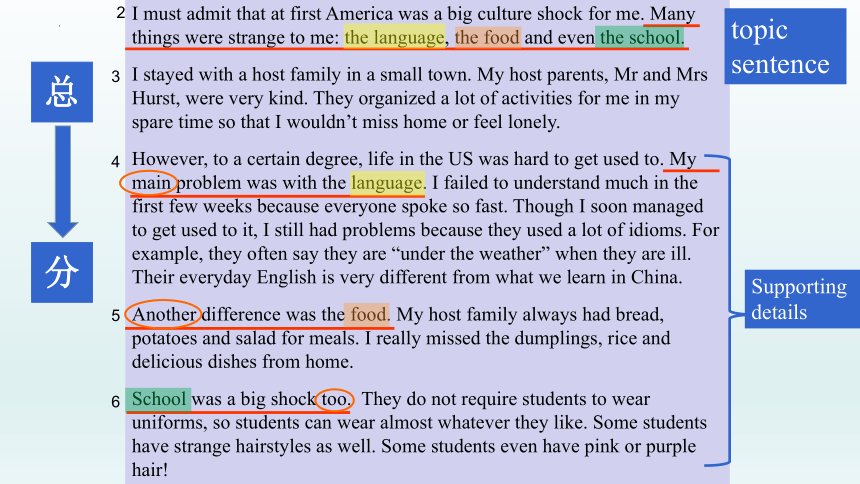
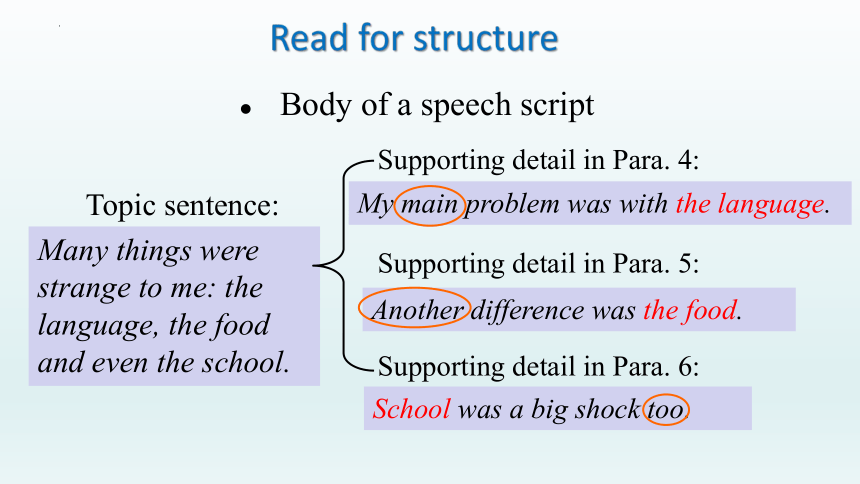
文档简介
(共30张PPT)
Unit 2 Culture Shock
Lesson 2 Reading
学习目标
1. 了解英语演讲稿的结构和语言特点;
2. 根据上下文,作出合理推断;
3. 正确理解和处理文化冲击;
4. 仿照课文撰写一篇如何正确处理文化冲击的英语演讲稿。
In which country do you usually see this
1. People set off fireworks to celebrate the Chinese New Year.
In China.
2. People must take off their shoes when they enter their homes.
In Japan.
In which country do you usually see this
3. People like eating fish and chips.
In Britain.
4. People have a big holiday on 4th July. It is Independence Day.
In America.
culture
culture shock
Before you read
Brad Li is a junior high school student in China. He visited the US on an international exchange last year, and now he is giving a speech about his experience.
Why did Brad live in another country
What type of text is this passage
A speech script 演讲稿
Opening: Paragraph(s) _____.
(开场白) Brad introduced himself and ____________ of
his speech.
Body: Paragraph(s) _____.
(正文) Brad talked about the life and _______________
he experienced in the US.
Closing: Paragraph(s) _____.
(结束语) Brad shared his feelings about the year in the
US--________ and ___________.
1
the purpose
the culture shock
2-6
7-8
exciting educational
Read for structure
I am here today to tell you about…
Paragraphs 7-8:
Anyway, I have many great memories of that year, especially playing in the snow in winter, and playing baseball. At Halloween, I went to a party dressed as Harry Potter. At Thanksgiving, we had a big dinner with a huge turkey.
It was an exciting year, and it was a valuable education for me. Now I understand more about American culture. My American friends asked me many questions about life in China, and this made me think about my own culture as well.
make a conclusion
to show opinions: exciting, educational, great…
A speech script 演讲稿
Opening: Paragraph(s) _____.
(开场白) Brad introduced himself and ____________ of
his speech.
Body: Paragraph(s) _____.
(正文) Brad talked about the life and _______________
he experienced in the US.
Closing: Paragraph(s) _____.
(结束语) Brad shared his feelings about the year in the
US--________ and ___________.
1
the purpose
the culture shock
2-6
7-8
exciting educational
Read for structure
I am here today to tell you about…
Anyway…; adj.
Read for structure
Read the body (正文) from Paragraphs 2-6. Think about the structure of this part.
Guided questions:
Is there a topic sentence in this part
Are there any supporting details If yes, what are they
What is the structure of the body
Are there any key words to help you work out the structure quickly
I must admit that at first America was a big culture shock for me. Many things were strange to me: the language, the food and even the school.
I stayed with a host family in a small town. My host parents, Mr and Mrs Hurst, were very kind. They organized a lot of activities for me in my spare time so that I wouldn’t miss home or feel lonely.
However, to a certain degree, life in the US was hard to get used to. My main problem was with the language. I failed to understand much in the first few weeks because everyone spoke so fast. Though I soon managed to get used to it, I still had problems because they used a lot of idioms. For example, they often say they are “under the weather” when they are ill. Their everyday English is very different from what we learn in China.
Another difference was the food. My host family always had bread, potatoes and salad for meals. I really missed the dumplings, rice and delicious dishes from home.
School was a big shock too. They do not require students to wear uniforms, so students can wear almost whatever they like. Some students have strange hairstyles as well. Some students even have pink or purple hair!
topic sentence
Supporting details
2
3
4
5
6
总
分
Body of a speech script
Many things were strange to me: the language, the food and even the school.
Supporting detail in Para. 4:
Supporting detail in Para. 5:
Supporting detail in Para. 6:
My main problem was with the language.
Another difference was the food.
School was a big shock too.
Topic sentence:
Read for structure
Read the passage carefully and answer the questions. Remember to find sentences in the passage to support your ideas.
Read for inference (推断)
How do you know that Brad had never been to the US before the exchange visit
What do you think of Brad’s host family
What does “idiom” in line 11 mean
What clothes does Brad wear at school in China How does he feel about American students with colorful hair
How do you know that Brad did not forget Chinese culture in the exchange year
Read the passage carefully and answer the questions. Remember to find sentences in the passage to support your ideas.
Read for inference (推断)
How do you know that Brad had never been to the US before the exchange visit
He says, “I must admit that at first America was a big culture shock for me.”
Read the passage carefully and answer the questions. Remember to find sentences in the passage to support your ideas.
Read for inference (推断)
What do you think of Brad’s host family
They were kind,
My host parents, Mr. and Mrs. Hurst, were very kind. They organized a lot of activities for me in my spare time so that I wouldn’t miss home or feel lonely. (lines 5-7)
thoughtful and helpful.
My host parents, Mr. and Mrs. Hurst, were very kind. They organized a lot of activities for me in my spare time so that I wouldn’t miss home or feel lonely. (lines 5-7)
in my spare time = in my free time / when I was free
在我空闲的时候
在我空闲的时候,我会给我的美国朋友介绍中国传统文化。
I would introduce my friends to traditional Chinese culture in my spare time.
Read the passage carefully and answer the questions. Remember to find sentences in the passage to support your ideas.
Read for inference (推断)
3. What does “idiom” in line 11 mean
A group of words that have a special meaning.
Though I soon managed to get used to it, I still had problems because they used a lot of idioms. For example, they often say they are “under the weather” when they are ill. (lines 10-12)
manage to do = succeed in doing sth., especially something difficult
设法做到
在我出发之前,我设法学会了太极。
I managed to learn t’ai chi before I set out.
Though I soon managed to get used to it, I still had problems because they used a lot of idioms. For example, they often say they are “under the weather” when they are ill. (lines 10-12)
Read the passage carefully and answer the questions. Remember to find sentences in the passage to support your ideas.
Read for inference (推断)
4. What clothes does Brad wear at school in China How does he feel about American students with colorful hair
Brad wears uniforms in China.
He feels very surprised about American students with colorful hair.
School was a shock too. They do not require students to wear uniforms, so students can wear almost whatever they like. Some students have strange hairstyles as well. Some students even have pink or purple hair! (lines 17-19)
whatever = anything or everything of a particular type
任何……东西
你可以画任何你喜欢的东西。
You can draw whatever you like.
School was a shock too. They do not require students to wear uniforms, so students can wear almost whatever they like. Some students have strange hairstyles as well. Some students even have pink or purple hair! (lines 17-19)
Students can wear almost whatever they like.
他们几乎可以穿任何他们喜欢的东西。
Read the passage carefully and answer the questions. Remember to find sentences in the passage to support your ideas.
Read for inference (推断)
How do you know that Brad did not forget Chinese culture in the exchange year
He says, “My American friends asked me many questions about life in China, and this made me think about my own culture as well.”
Read for inference (推断)
Tip:
Find sentences from the passage and analyze their meanings carefully.
Show your opinion
Did Brad deal with culture shock in America successfully Support your opinions with sentences from his speech.
One possible idea:
I think Brad dealt with culture shock in America quite successfully. At first, he had great difficulty with communication, food and school life. But he did not give up and kept a positive attitude towards the culture shock. For example, he took part in the cultural activities. He had a better understanding of his own culture as well. In the end, he got used to the life in the US and had many great memories of the exchange year.
Anyway, I have many great memories of that year, especially playing in the snow in winter, and playing baseball. At Halloween, I went to a party dressed as Harry Potter. At Thanksgiving, we had a big dinner with a huge turkey. (lines 20-23)
This made me think about my own culture as well. (lines 26-27)
What can we learn from Brad’s experience in dealing with culture shock properly
Do as the Romans do when in Rome.
It is common to experience culture shock when we first live in another country. Just take part in the local activities and keep an open mind. Just like Brad, he played in the snow in winter and played baseball. He went to a dress-up party and tried traditional local food at holidays. These all helped him get used to the new life in the new environment.
What can we learn from Brad’s experience in dealing with culture shock properly
Rooted in China, eyes on the world!
When we compare foreign culture with our own culture, we will have a better understanding of our own culture. So get ready to be an ambassador of Chinese culture (中国文化大使).
Have a try!
If you were Brad Li, give another speech to your schoolmates who are going to take part in the same international exchange this year.
In your speech script:
Follow the structure of a speech.
Give suggestions on what they can prepare to deal with culture shock according to your speech Living in another country.
Opening
Body
Closing
Topic sentence
Supporting detail
Supporting detail
Supporting detail
I’m here today to…
Anyway…; adj.
Suggestions on language problems
Suggestions on differences of school life
learn some idioms
practise speaking English every day…
Suggestions on differences of food
learn to cook Chinese food for foreign friends…
bring photos of school life in China
get ready to join in school activities…
Tips to write your speech script
Summary
1. Structure of a speech script
Opening
Body
Closing
Topic sentence
Supporting detail
Supporting detail
Supporting detail
I’m here today to…
Anyway…; adj.
main …
Another…
… too
2. Get inference from sentences in the passage.
3. Set up proper attitudes towards culture shock and dealing with culture shock.
4. Write a speech script on how to deal with culture shock.
Homework
1. Finish the exercises on P20-21 in your textbook.
2. Improve your speech script and share it with your classmates.
Thank you !
Unit 2 Culture Shock
Lesson 2 Reading
学习目标
1. 了解英语演讲稿的结构和语言特点;
2. 根据上下文,作出合理推断;
3. 正确理解和处理文化冲击;
4. 仿照课文撰写一篇如何正确处理文化冲击的英语演讲稿。
In which country do you usually see this
1. People set off fireworks to celebrate the Chinese New Year.
In China.
2. People must take off their shoes when they enter their homes.
In Japan.
In which country do you usually see this
3. People like eating fish and chips.
In Britain.
4. People have a big holiday on 4th July. It is Independence Day.
In America.
culture
culture shock
Before you read
Brad Li is a junior high school student in China. He visited the US on an international exchange last year, and now he is giving a speech about his experience.
Why did Brad live in another country
What type of text is this passage
A speech script 演讲稿
Opening: Paragraph(s) _____.
(开场白) Brad introduced himself and ____________ of
his speech.
Body: Paragraph(s) _____.
(正文) Brad talked about the life and _______________
he experienced in the US.
Closing: Paragraph(s) _____.
(结束语) Brad shared his feelings about the year in the
US--________ and ___________.
1
the purpose
the culture shock
2-6
7-8
exciting educational
Read for structure
I am here today to tell you about…
Paragraphs 7-8:
Anyway, I have many great memories of that year, especially playing in the snow in winter, and playing baseball. At Halloween, I went to a party dressed as Harry Potter. At Thanksgiving, we had a big dinner with a huge turkey.
It was an exciting year, and it was a valuable education for me. Now I understand more about American culture. My American friends asked me many questions about life in China, and this made me think about my own culture as well.
make a conclusion
to show opinions: exciting, educational, great…
A speech script 演讲稿
Opening: Paragraph(s) _____.
(开场白) Brad introduced himself and ____________ of
his speech.
Body: Paragraph(s) _____.
(正文) Brad talked about the life and _______________
he experienced in the US.
Closing: Paragraph(s) _____.
(结束语) Brad shared his feelings about the year in the
US--________ and ___________.
1
the purpose
the culture shock
2-6
7-8
exciting educational
Read for structure
I am here today to tell you about…
Anyway…; adj.
Read for structure
Read the body (正文) from Paragraphs 2-6. Think about the structure of this part.
Guided questions:
Is there a topic sentence in this part
Are there any supporting details If yes, what are they
What is the structure of the body
Are there any key words to help you work out the structure quickly
I must admit that at first America was a big culture shock for me. Many things were strange to me: the language, the food and even the school.
I stayed with a host family in a small town. My host parents, Mr and Mrs Hurst, were very kind. They organized a lot of activities for me in my spare time so that I wouldn’t miss home or feel lonely.
However, to a certain degree, life in the US was hard to get used to. My main problem was with the language. I failed to understand much in the first few weeks because everyone spoke so fast. Though I soon managed to get used to it, I still had problems because they used a lot of idioms. For example, they often say they are “under the weather” when they are ill. Their everyday English is very different from what we learn in China.
Another difference was the food. My host family always had bread, potatoes and salad for meals. I really missed the dumplings, rice and delicious dishes from home.
School was a big shock too. They do not require students to wear uniforms, so students can wear almost whatever they like. Some students have strange hairstyles as well. Some students even have pink or purple hair!
topic sentence
Supporting details
2
3
4
5
6
总
分
Body of a speech script
Many things were strange to me: the language, the food and even the school.
Supporting detail in Para. 4:
Supporting detail in Para. 5:
Supporting detail in Para. 6:
My main problem was with the language.
Another difference was the food.
School was a big shock too.
Topic sentence:
Read for structure
Read the passage carefully and answer the questions. Remember to find sentences in the passage to support your ideas.
Read for inference (推断)
How do you know that Brad had never been to the US before the exchange visit
What do you think of Brad’s host family
What does “idiom” in line 11 mean
What clothes does Brad wear at school in China How does he feel about American students with colorful hair
How do you know that Brad did not forget Chinese culture in the exchange year
Read the passage carefully and answer the questions. Remember to find sentences in the passage to support your ideas.
Read for inference (推断)
How do you know that Brad had never been to the US before the exchange visit
He says, “I must admit that at first America was a big culture shock for me.”
Read the passage carefully and answer the questions. Remember to find sentences in the passage to support your ideas.
Read for inference (推断)
What do you think of Brad’s host family
They were kind,
My host parents, Mr. and Mrs. Hurst, were very kind. They organized a lot of activities for me in my spare time so that I wouldn’t miss home or feel lonely. (lines 5-7)
thoughtful and helpful.
My host parents, Mr. and Mrs. Hurst, were very kind. They organized a lot of activities for me in my spare time so that I wouldn’t miss home or feel lonely. (lines 5-7)
in my spare time = in my free time / when I was free
在我空闲的时候
在我空闲的时候,我会给我的美国朋友介绍中国传统文化。
I would introduce my friends to traditional Chinese culture in my spare time.
Read the passage carefully and answer the questions. Remember to find sentences in the passage to support your ideas.
Read for inference (推断)
3. What does “idiom” in line 11 mean
A group of words that have a special meaning.
Though I soon managed to get used to it, I still had problems because they used a lot of idioms. For example, they often say they are “under the weather” when they are ill. (lines 10-12)
manage to do = succeed in doing sth., especially something difficult
设法做到
在我出发之前,我设法学会了太极。
I managed to learn t’ai chi before I set out.
Though I soon managed to get used to it, I still had problems because they used a lot of idioms. For example, they often say they are “under the weather” when they are ill. (lines 10-12)
Read the passage carefully and answer the questions. Remember to find sentences in the passage to support your ideas.
Read for inference (推断)
4. What clothes does Brad wear at school in China How does he feel about American students with colorful hair
Brad wears uniforms in China.
He feels very surprised about American students with colorful hair.
School was a shock too. They do not require students to wear uniforms, so students can wear almost whatever they like. Some students have strange hairstyles as well. Some students even have pink or purple hair! (lines 17-19)
whatever = anything or everything of a particular type
任何……东西
你可以画任何你喜欢的东西。
You can draw whatever you like.
School was a shock too. They do not require students to wear uniforms, so students can wear almost whatever they like. Some students have strange hairstyles as well. Some students even have pink or purple hair! (lines 17-19)
Students can wear almost whatever they like.
他们几乎可以穿任何他们喜欢的东西。
Read the passage carefully and answer the questions. Remember to find sentences in the passage to support your ideas.
Read for inference (推断)
How do you know that Brad did not forget Chinese culture in the exchange year
He says, “My American friends asked me many questions about life in China, and this made me think about my own culture as well.”
Read for inference (推断)
Tip:
Find sentences from the passage and analyze their meanings carefully.
Show your opinion
Did Brad deal with culture shock in America successfully Support your opinions with sentences from his speech.
One possible idea:
I think Brad dealt with culture shock in America quite successfully. At first, he had great difficulty with communication, food and school life. But he did not give up and kept a positive attitude towards the culture shock. For example, he took part in the cultural activities. He had a better understanding of his own culture as well. In the end, he got used to the life in the US and had many great memories of the exchange year.
Anyway, I have many great memories of that year, especially playing in the snow in winter, and playing baseball. At Halloween, I went to a party dressed as Harry Potter. At Thanksgiving, we had a big dinner with a huge turkey. (lines 20-23)
This made me think about my own culture as well. (lines 26-27)
What can we learn from Brad’s experience in dealing with culture shock properly
Do as the Romans do when in Rome.
It is common to experience culture shock when we first live in another country. Just take part in the local activities and keep an open mind. Just like Brad, he played in the snow in winter and played baseball. He went to a dress-up party and tried traditional local food at holidays. These all helped him get used to the new life in the new environment.
What can we learn from Brad’s experience in dealing with culture shock properly
Rooted in China, eyes on the world!
When we compare foreign culture with our own culture, we will have a better understanding of our own culture. So get ready to be an ambassador of Chinese culture (中国文化大使).
Have a try!
If you were Brad Li, give another speech to your schoolmates who are going to take part in the same international exchange this year.
In your speech script:
Follow the structure of a speech.
Give suggestions on what they can prepare to deal with culture shock according to your speech Living in another country.
Opening
Body
Closing
Topic sentence
Supporting detail
Supporting detail
Supporting detail
I’m here today to…
Anyway…; adj.
Suggestions on language problems
Suggestions on differences of school life
learn some idioms
practise speaking English every day…
Suggestions on differences of food
learn to cook Chinese food for foreign friends…
bring photos of school life in China
get ready to join in school activities…
Tips to write your speech script
Summary
1. Structure of a speech script
Opening
Body
Closing
Topic sentence
Supporting detail
Supporting detail
Supporting detail
I’m here today to…
Anyway…; adj.
main …
Another…
… too
2. Get inference from sentences in the passage.
3. Set up proper attitudes towards culture shock and dealing with culture shock.
4. Write a speech script on how to deal with culture shock.
Homework
1. Finish the exercises on P20-21 in your textbook.
2. Improve your speech script and share it with your classmates.
Thank you !
